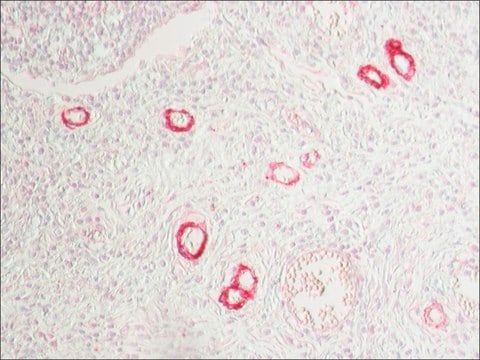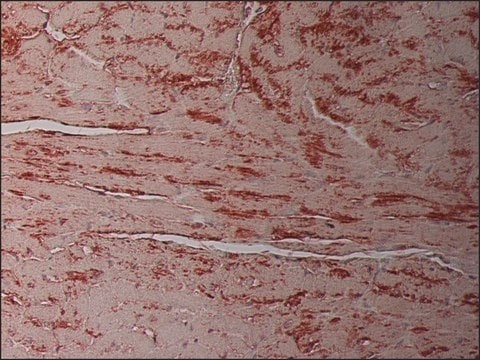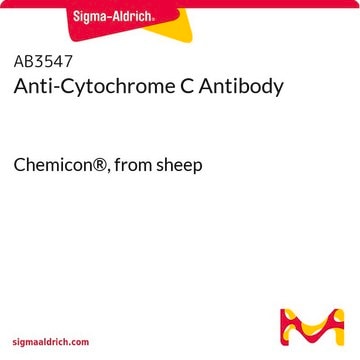P300-05
Porcine Coronary Artery Endothelial: PCAEC (Cryovial)
Autenticatiper visualizzare i prezzi riservati alla tua organizzazione & contrattuali
About This Item
Codice UNSPSC:
41106514
NACRES:
NA.81
Prodotti consigliati
Origine biologica
Porcine coronary artery
Livello qualitativo
Forma fisica
solid
Confezionamento
pkg of 500,000 cells
Produttore/marchio commerciale
Cell Applications, Inc
Modalità di accrescimento
Adherent
Cariotipo
2n = 38
Morfologia
Endothelial
tecniche
cell culture | mammalian: suitable
Malattie correlate
cardiovascular diseases
Condizioni di spedizione
dry ice
Temperatura di conservazione
−196°C
Categorie correlate
Descrizione generale
Lot specific orders are not able to be placed through the web. Contact your local sales rep for more details.
Arterial endothelial cells play critical roles in cardiac homeostasis, and insults to the endothelial cells have been linked to a variety of vascular diseases. Porcine artery endothelial cells provide a useful tool to study artery endothelial function and metabolism.PCAEC from Cell Applications, Inc. have been used to investigate a new mechanism of obesity-associated vascular disease by demonstrating that resistin, an adipocyte-derived cytokine implemented in insulin resistance and diabetes, can cause endothelial dysfunction in coronary arteries through oxidative stress and down-regulation of NO synthase (Kougias, 2005). Conversely, secretoneurin was shown to activate expression of NO synthase and calmodulin, leading to endothelial relaxation (Chan, 2011). PCAEC were also used in adhesion and transmigration experiments in a study investigating anti-inflammatory, cardioprotective effects of a novel adenosine-lidocaine drug formulation (Shi, 2012).
Arterial endothelial cells play critical roles in cardiac homeostasis, and insults to the endothelial cells have been linked to a variety of vascular diseases. Porcine artery endothelial cells provide a useful tool to study artery endothelial function and metabolism.PCAEC from Cell Applications, Inc. have been used to investigate a new mechanism of obesity-associated vascular disease by demonstrating that resistin, an adipocyte-derived cytokine implemented in insulin resistance and diabetes, can cause endothelial dysfunction in coronary arteries through oxidative stress and down-regulation of NO synthase (Kougias, 2005). Conversely, secretoneurin was shown to activate expression of NO synthase and calmodulin, leading to endothelial relaxation (Chan, 2011). PCAEC were also used in adhesion and transmigration experiments in a study investigating anti-inflammatory, cardioprotective effects of a novel adenosine-lidocaine drug formulation (Shi, 2012).
Origine della linea cellulare
Artery
Applicazioni
cardiovascular function, angiogenesis, vascular biology, regulation of coronary blood flow, cardiac functions, effects of vaso-dilators, coagulation, fibrinolysis, vessel wall tone, cytokine production
Componenti
Porcine Endothelial Cell Growth Medium that contains 10% FBS and 10% DMSO
Nota sulla preparazione
- 2nd passage, >500,000 cells in Porcine Endothelial Cell Growth Medium that contains 10% FBS and 10% DMSO
- Can be cultured at least 12 doublings
Mantenimento delle subcolture
Please refer to the PCAEC Culture Protocol.
Codice della classe di stoccaggio
11 - Combustible Solids
Classe di pericolosità dell'acqua (WGK)
WGK 3
Punto d’infiammabilità (°F)
Not applicable
Punto d’infiammabilità (°C)
Not applicable
Certificati d'analisi (COA)
Cerca il Certificati d'analisi (COA) digitando il numero di lotto/batch corrispondente. I numeri di lotto o di batch sono stampati sull'etichetta dei prodotti dopo la parola ‘Lotto’ o ‘Batch’.
Possiedi già questo prodotto?
I documenti relativi ai prodotti acquistati recentemente sono disponibili nell’Archivio dei documenti.
Il team dei nostri ricercatori vanta grande esperienza in tutte le aree della ricerca quali Life Science, scienza dei materiali, sintesi chimica, cromatografia, discipline analitiche, ecc..
Contatta l'Assistenza Tecnica.








